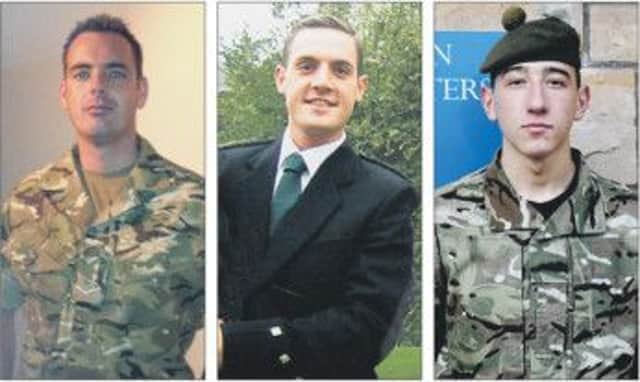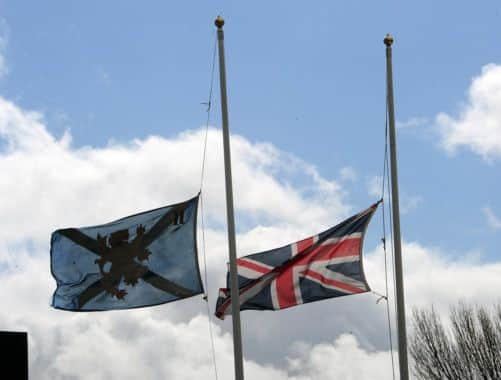Three Scots soldiers die in Afghanistan bomb blast


SEE ALSO:
The servicemen, from The Royal Regiment of Scotland, died while on a routine patrol in the Nahr-e Saraj district of Helmand Province in the worst loss of life for soldiers from a Scottish regiment in a single attack since the beginning of the conflict in Afghanistan. It was the first time soldiers have lost their lives in a roadside attack on a Mastiff 3 vehicle, the Ministry of Defence said.


The trio were named by the MoD as Corporal William Savage and Fusilier Samuel Flint, both of The Royal Highland Fusiliers, 2nd Battalion The Royal Regiment of Scotland and Private Robert Hetherington from 51st Highland, 7th Battalion The Royal Regiment of Scotland. Their next of kin have been informed.
Advertisement
Hide AdAdvertisement
Hide AdSix other soldiers from 2 SCOTS wounded in the attack are being treated for injuries which are not thought to be life-threatening.
The Prime Minister said the vehicles had a “good record of withstanding blasts” from improvised explosives, but they would have to be examined.
He said: “We have done an enormous amount to improve the quality and quantity of protective vehicles that our soldiers use out in Afghanistan and this particular vehicle as I understand it had a pretty good record of withstanding blasts from IEDs (improvised explosive devices).
“So I’m sure we will want to look at that carefully and put in place everything we can to make sure our brave men and women have the best protective equipment.”
Advertisement
Hide AdAdvertisement
Hide AdHe also paid tribute to the soldiers who died and said it was “a reminder of the high price we have paid as a country to help give this country a chance of safety and security in the future”.
Brigadier Rupert Jones MBE, Commander Task Force Helmand, said: “The loss of these three brave Scottish soldiers comes as a great blow to everyone in the Task Force, but leaves us all the more determined in our task to do justice to their memory.
“Their families are in our thoughts and I hope that they can draw a little comfort from the affection in which Corporal Savage, Fusilier Flint and Private Hetherington were held by their brothers in arms and from the courage they displayed.”
The deaths take to 444 the number of UK service members who have lost their lives since operations in Afghanistan began in October 2001. Six have died in 2013, including the three soldiers killed on Tuesday.
Advertisement
Hide AdAdvertisement
Hide AdAbout 350 soldiers from 2 SCOTS, based at Glencorse Barracks in Penicuik, were deployed to Afghanistan in March to start a six-month operational tour of Helmand.
The attack came on the third day of what the Taleban has called its “spring offensive”, which some defence experts say will be the most ferocious yet, ahead of the Nato hand-over of security responsibilities to Afghan forces next year.
First Minister Alex Salmond said: “No words can truly bring comfort to the families at a time like this, but the thoughts and prayers of everyone in Scotland will be with them upon hearing this dreadful news.”
According to reports, the explosion was caused by a huge bomb and army officials are looking into whether insurgents are designing bigger explosives aimed at piercing the Mastiff’s heavy armour.
Advertisement
Hide AdAdvertisement
Hide AdIt is unclear whether the bomb penetrated the 23-tonne vehicle or lifted it off the road and turned it over when it was hit five miles north of the provincial capital Lashkar Gah.
The Mastiff was brought in to replace the heavily-criticised Snatch Land Rovers, which are lightly-armoured and were originally developed for use in Northern Ireland, and the Cold War-era Warrior, in which six soldiers were killed in Kandahar province last March.
As well having heavy armour, the vehicle, which can carry two crew and eight passengers, has a V-shaped hull to deflect the blast upwards and outwards.
Former army chief of staff Lord Dannatt said enemy fighters must have used an explosive device large enough to overcome these safety measures.
Advertisement
Hide AdAdvertisement
Hide Ad“The Taleban have found a way of countering the protective qualities and characteristics of the Mastiff”, he said. “It would seem that this was an extremely large bomb that was so powerful that it was able to cause fatalities within the vehicle itself.”
Lieutenant Colonel Stuart Crawford, a former officer in the Royal Tank Regiment, from Edinburgh, said the soldiers using the Mastiff 3 had some of the best protection available.
He said: “The Mastiff was specifically procured by the British army to protect our troops and up until now its seems to have done the job.”
Lt Col Crawford also predicted a rapid escalation of violence in the run up to British troops leaving in late 2014. He said: “After western troops leave there will be a power struggle, internal strife between groups, and each will want to say they were responsible for the infidels leaving the country. Before then, as the UK withdrawal gets nearer, we will see an increasing number of attacks.
Advertisement
Hide AdAdvertisement
Hide Ad“Afghanistan, in my opinion, has always been an unwinnable war. They can last longer than we can. They are experts at this type of war. It’s in their blood.”
The flags outside Glencorse Barracks, seven miles south of Edinburgh, flew at half-mast last night, as the residents of Penicuik described the deaths as “a terrible tragedy”.
“Most of the people I know with connections to the army are at home with their families”, said Elaine Blair, who was shopping in the town yesterday. “It’s more young lives lost.”
Another resident, James Paterson, added: “It’s a terrible thing, but war will go on and on. I can’t see it
ending”.
Advertisement
Hide AdAdvertisement
Hide AdRev Stephen Blakey, the Chaplain at Glencorse Barracks, said a chaplain will be appointed to provide support for each of the affected families. He added: “At times like this, there’s a strength that comes from gathering together. It helps them all, it’s very important.”